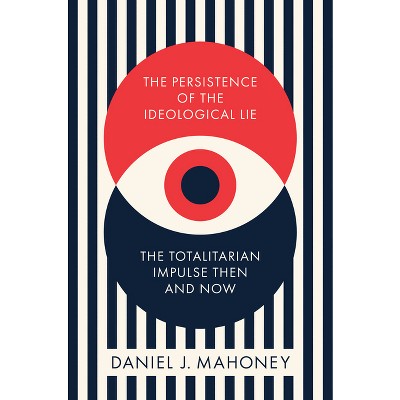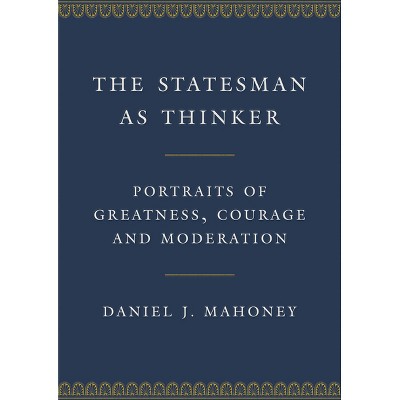Sponsored

De Gaulle - by Daniel J Mahoney (Hardcover)
In Stock
Sponsored
About this item
Highlights
- Mahoney provides a comprehensive study of the thought and action of Charles de Gaulle.
- About the Author: DANIEL J. MAHONEY teaches political science at Assumption College, Worcester, MA.
- 208 Pages
- History, Europe
Description
About the Book
Mahoney provides a comprehensive study of the thought and action of Charles de Gaulle. This volume is neither a biography nor a historical narrative, although it addresses important aspects of de Gaulle's life and political career. Mahoney asserts that de Gaulle is systematically misunderstood, especially in the Anglo-American world. He is sometimes dismissed as a narrow or quixotic nationalist, pigeon-holed as an irrational anti-American, and often labelled with various anti-democratic appellations such as Bonapartist or Nietzschean. In responding to this wide-spread misunderstanding, Mahoney analyzes de Gaulle's approach to the problem of modern democracy, and he shows that de Gaulle neither despaired of liberal democracy nor succumbed to the illusions that anything is better than democratic mediocrity.
De Gaulle believed that human beings were political animals who naturally desired to live in communities dedicated to shared, noble purposes. He also knew that modern men are individuals who resist or ignore these purposes. The statesman-writer de Gaulle believed it was the task of statesmanship to kindle these political purposes by reaching for the summits--for the dazzling light of national unity and ambition that he called grandeur. Mahoney shows that de Gaulle did not despair of liberal democracy; he did not succumb to the illusions of the impatient or tyrannical that anything is better than democratic mediocrity. This is an important corrective to scholars and students of modern political thought and European history, as well as an invaluable guide to democratic statesmanship in our time.
Book Synopsis
Mahoney provides a comprehensive study of the thought and action of Charles de Gaulle. This volume is neither a biography nor a historical narrative, although it addresses important aspects of de Gaulle's life and political career. Mahoney asserts that de Gaulle is systematically misunderstood, especially in the Anglo-American world. He is sometimes dismissed as a narrow or quixotic nationalist, pigeon-holed as an irrational anti-American, and often labelled with various anti-democratic appellations such as Bonapartist or Nietzschean. In responding to this wide-spread misunderstanding, Mahoney analyzes de Gaulle's approach to the problem of modern democracy, and he shows that de Gaulle neither despaired of liberal democracy nor succumbed to the illusions that anything is better than democratic mediocrity.
De Gaulle believed that human beings were political animals who naturally desired to live in communities dedicated to shared, noble purposes. He also knew that modern men are individuals who resist or ignore these purposes. The statesman-writer de Gaulle believed it was the task of statesmanship to kindle these political purposes by reaching for the summits--for the dazzling light of national unity and ambition that he called grandeur. Mahoney shows that de Gaulle did not despair of liberal democracy; he did not succumb to the illusions of the impatient or tyrannical that anything is better than democratic mediocrity. This is an important corrective to scholars and students of modern political thought and European history, as well as an invaluable guide to democratic statesmanship in our time.Review Quotes
"One of Daniel Mahoney's great merits is to reconstitute, on the basis of de Gaulle's writings, de Gaulle's view of the whole, of politics and of the human condition in general. He shows in a convincing manner that, contrary to a reproach often leveled against him, de Gaulle was not at all "Nietzschean..,."I admire the fact that Daniel Mahoney--who already has published a remarkable work on Raymond Aron--understands French things so well. I admire even more the power of the work, the fertile passion and the intelligence with which he strives to comprehend the human meaning of politics."-from the foreword by Pierre Manent Ecole des Hautes Etudes en Sciences Sociales
?Daniel J. Mahoney's scholarship allies itself with civic virtue in a world not conspicuously receptive to it....He has now written the best first book to read on Charles de Gaulle....Mahoney is a new kind of American scholar, one who views grandeur without malice, one who can see it in de Gaulle.?-Interpretation
?Mahoney's book...is a seminal contribution to providing a more balanced account of the "grandeur within liberty" that characterized de Gaulle's political deliberation and endeavor, and will be useful for students and academics pursuing studies on the relationship between democracy and authority. By showing that de Gaulle was not merely an irrational and temperamental tyrant, but acted on doctrines systematically envisioned. Mahoney adds to a greater understanding both of de Gaulle and of political leadership.?-Perspectives on Political Science
?No biographer or historian has yet quite captured the greatness of Charles de Gaulle. Daniel J. Mahoney's book takes a new approach. It is an extraordinarily penetrating and original study of de Gaulle as political thinker....More than a treatment of the well-known aspects of de Gaulle's career, Mahoney has written a work of political reflection. His astounding claim is that de Gaulle's books and speeches, analyzed in the light of his deeds, are a source of profound insight, not only into political life but into the human condition. To make his case, Mahoney must overcome our prejudice against the truth and relevance of the statesman's view of morality and politics. Mahoney succeeds wonderfully.?-The Weekly Standard
?On no other figure--save perhaps Jerry Lewis--have the perceptions of the French and their English-speaking allies been more divided than on Charles de Gaulle....Mahoney has analyzed de Gaulle's own writings in an effort to make this complex man more accessible to Anglo-American scholars....it is an important acquisition for graduate and specialist collections.?-Choice
?On the crucial distinction between legality and legitimacy, on the constant tensions between the need for heroic leadership and the imperatives of modern democracy as well as between the call of national grandeur and the humdrum concerns and multiple divisions of contemporary society, on de Gaulle's attempt to reconcile the primacy of the nation with his vision of a confederal Europe, Mahoney is both perceptive and eloquent. His emphasis on the Catholic dimension of de Gaulle, on the influence of Charles Peguy (rather than Nietzsche), and his remarks on the similarities between de Gaulle's thought and the ideas of de Tocqueville and Weber are particularly welcome.?-Foreign Affairs
"Daniel J. Mahoney's scholarship allies itself with civic virtue in a world not conspicuously receptive to it....He has now written the best first book to read on Charles de Gaulle....Mahoney is a new kind of American scholar, one who views grandeur without malice, one who can see it in de Gaulle."-Interpretation
"Mahoney's book...is a seminal contribution to providing a more balanced account of the "grandeur within liberty" that characterized de Gaulle's political deliberation and endeavor, and will be useful for students and academics pursuing studies on the relationship between democracy and authority. By showing that de Gaulle was not merely an irrational and temperamental tyrant, but acted on doctrines systematically envisioned. Mahoney adds to a greater understanding both of de Gaulle and of political leadership."-Perspectives on Political Science
"On no other figure--save perhaps Jerry Lewis--have the perceptions of the French and their English-speaking allies been more divided than on Charles de Gaulle....Mahoney has analyzed de Gaulle's own writings in an effort to make this complex man more accessible to Anglo-American scholars....it is an important acquisition for graduate and specialist collections."-Choice
"On the crucial distinction between legality and legitimacy, on the constant tensions between the need for heroic leadership and the imperatives of modern democracy as well as between the call of national grandeur and the humdrum concerns and multiple divisions of contemporary society, on de Gaulle's attempt to reconcile the primacy of the nation with his vision of a confederal Europe, Mahoney is both perceptive and eloquent. His emphasis on the Catholic dimension of de Gaulle, on the influence of Charles Peguy (rather than Nietzsche), and his remarks on the similarities between de Gaulle's thought and the ideas of de Tocqueville and Weber are particularly welcome."-Foreign Affairs
"No biographer or historian has yet quite captured the greatness of Charles de Gaulle. Daniel J. Mahoney's book takes a new approach. It is an extraordinarily penetrating and original study of de Gaulle as political thinker....More than a treatment of the well-known aspects of de Gaulle's career, Mahoney has written a work of political reflection. His astounding claim is that de Gaulle's books and speeches, analyzed in the light of his deeds, are a source of profound insight, not only into political life but into the human condition. To make his case, Mahoney must overcome our prejudice against the truth and relevance of the statesman's view of morality and politics. Mahoney succeeds wonderfully."-The Weekly Standard
About the Author
DANIEL J. MAHONEY teaches political science at Assumption College, Worcester, MA./ee is the author of The Liberal Political Science of Raymond Aron (1992), and the editor of In Defense of Political Reason (1994).










